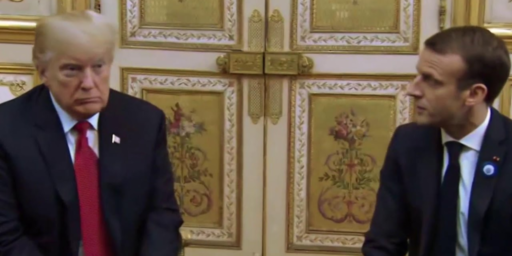Macron Wins Re-Election
The boring moderate beat the neo-Nazi with 58% of the vote.

France 24, “Breaking: Macron re-elected French president with 58.2% of the vote“
Centrist incumbent president Emmanuel Macron has been re-elected French president with an estimated 58.2% of the vote, while his far-right challenger Marine Le Pen, took 41.8%. After a fractious campaign that has seen the far right come its closest yet to winning power.
AP, “Polling agencies project Macron to be reelected in France“
French polling agencies are projecting that centrist President Emmanuel Macron will win France’s presidential runoff Sunday, beating far-right rival Marine Le Pen in a tight race that was overshadowed by the war in Ukraine and saw a surge in French support for extremist ideas.
If the projections are borne out by official results, Macron would be the first French president in 20 years to win a second term, since Jacques Chirac in 2002. But he would face a divided nation and a battle to keep his parliamentary majority in legislative elections in June.
Five years ago, Macron won a sweeping victory to become France’s youngest president at 39. The margin is expected to be way smaller this time: Polling agencies Opinionway, Harris and Ifop projected that Macron would win between 57% and 58.5% percent of the vote, with Le Pen getting between 41.5% and 43%.
WSJ, “Macron Re-Elected as France’s President—Projections“
French President Emmanuel Macron was re-elected Sunday, according to projections based on early ballot counts, overcoming deep divisions among voters worried about inflation and the impact of immigration on France’s national identity.
Mr. Macron garnered 58.2% of the estimated vote Sunday, while far-right leader Marine Le Pen won 41.8%, according to a projection from polling firm Ipsos.
Mr. Macron, 44 years old, becomes the first French president to secure a second term in office since 2002, when then-President Jacques Chirac beat Ms. Le Pen’s father, Jean-Marie Le Pen, in a 64-percentage-point landslide. Since then, however, the country has fractured along economic, generational and geographical lines, with wealthier urban voters gravitating toward Mr. Macron and younger working-class voters in France’s rural areas backing Ms. Le Pen.
Mr. Macron is now under pressure to unite millions of French who cast ballots for his rivals in the election’s first-round of voting, when more than 50% of the vote went to candidates on the far-right and far-left. At stake is Mr. Macron’s drive to consolidate years of pro-business overhauls to the French economy—from tax cuts to his loosening of rules on hiring and firing employees—that have fueled discontent among voters who haven’t prospered under his administration.
This was the expected outcome and, indeed, almost exactly what the polls predicted. Then again, we all thought Hillary Clinton would win convincingly in 2016, too.






Well, polling in certain states did far worse in both 2016 and 2020 than it did here. And I still don’t know why that was. Does anyone?
But a 10 point lead is a 10 point lead. Even the poor results mentioned above were not in the “off by 10 points” territory.
@Jay L Gischer: It’s just hard to do micro-level polling. The national results in 2016 were remarkably close to what the pollsters predicted; it was just small errors in three states that doomed the Electoral College forecast.
I haven’t spent much time studying polling in French elections. As a rule, I like a system in which everyone can pick their favorite candidate in the first round and them choose among the “lesser of evils” in the second. I’d much, much prefer that happen in some sort of ranked choice/instant runoff format than require people turn out a second time. Turnout is typically far lower in the second round.
Boring moderate?
That is Unthinking Copy Paste Amerianism pasted in sans relation to the actual real subject.
Macron is many things, but “boring” is not it. Polarising centre rightist, yes. Boring no, his reputation is not being boring (that was Hollande).
In any case an excellent result as strong enough to help his recoalescing agenda continue, even if the signs of the national populist floating-between-Left-and-Right reaction are there. But this is common to all the major developed economies, and not rooted in a particular system but structural socio-economic change.
Shouldn’t Rudy and Powell and co. head to Paris at once? There’s a whole country’s legal system where they haven’t lost dozens of cases yet.
@Kathy: As Ms. Le Pen is not contesting the results importing Trump commets really is entirely sans interest.
On real results, the non-voting rate being cited by Le Monde is 28.2%, double that of the preceding election when they faced off, but not as bad as fears. Of course in 17 people could write on to Macron all kinds of anticipations from Left or Right whereas now he has a clear track record of an economic liberal (for France that is) and more right centre than some of the 2017 electorate expected.
@Lounsbury: Omitted that the non-voting rate is highish but not outside of historical 2nd term experience for 2nd rounds.
Thankfully, France doesn’t have an electoral college to thwart the will of the people. Or a Jim Comey.
Another defeat for Putin.
@James Joyner:
I don’t see how ranked choice polling changes the condition you describe unless the assumption is that a person is going to have second/third/fourth choices–although, I suppose that some do. If, in fact, you eventually NEED TO choose between Macron and Le Pen, because they are the most logical front runners, why not just pick that person first and be done? (In case you’re wondering, yes, I’m a person who will vote for my candidate in the first round and then let the constituencies of the winners fight it out without me. In the US conditions, the solution is to simply not let anyone who’s not a D or a R run for Prez, not forcing me to eventually choose D or R. Requiring me to select between the devil and the deep blue sea is not democracy in my mind.)
” Turnout is typically far lower in the second round.”
Hmm… I wonder why?
@Just nutha ignint cracker: The ballot routinely includes presidential candidates who are not D or R. Ross Perot, Ralph Nader, Gary Johnson, and Jill Stein are some of the recently famous and infamous examples.
Instead of complaining about how being forced to vote D or R is a perversion of democracy, we Americans should be doing the hard work of democracy and party building: donating, canvassing, campaigning, organizing, registering voters, etc.
Democracy is not a spectator sport. Party building isn’t magic. It takes work. If those of us who’ve spent the last 20 years crying about the supposed lack of partisan choices had instead been working to create more durably viable options, this alleged problem would be solved already.
Generally, Americans are just politically lazy. We want want everybody else to do the work and make the sacrifices, so we can just show up on election day and magically have all these wonderful choices. It’s not going to happen. Instead we will continue to make excuses for our laziness and complain about the inevitable results of the same. It is what it is.